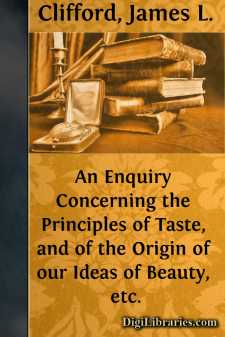Philosophy
- Aesthetics
- Eastern 1
- Ethics & Moral Philosophy 2
- General 30
- Hindu 2
- History & Surveys 3
- Logic 1
- Metaphysics 3
- Political 1
- Religious 7
- Social 3
- Taoist 1
Aesthetics Books
Sort by:
PREFACE IN the daily life of the ordinary man, a life crowded with diverse interests and increasingly complex demands, some few moments of a busy week or month or year are accorded to an interest in art. Whatever may be his vocation, the man feels instinctively that in his total scheme of life books, pictures, music have somewhere a place. In his own business or profession he is an expert, a man of...
more...
by:
Maurice Baring
INTRODUCTION he long obscurity of the Dark Ages lifted over Italy, awakening to a national though a divided consciousness. Already two distinct tendencies were apparent. The practical and rational, on the one hand, was soon to be outwardly reflected in the burgher-life of Florence and the Lombard cities, while at Rome it had even then created the civil organization of the curia. The novella was its...
more...
INTRODUCTION. The special subject of the greater part of the letters and essays of Schiller contained in this volume is Aesthetics; and before passing to any remarks on his treatment of the subject it will be useful to offer a few observations on the nature of this topic, and on its treatment by the philosophical spirit of different ages. First, then, aesthetics has for its object the vast realm of the...
more...
by:
Vernon Lee
THE USE OF BEAUTY. I. One afternoon, in Rome, on the way back from the Aventine, the road-mender climbed onto the tram as it trotted slowly along, and fastened to its front, alongside of the place of the driver, a bough of budding bay. Might one not search long for a better symbol of what we may all do by our life? Bleakness, wind, squalid streets, a car full of heterogeneous people, some very dull,...
more...
by:
John Armstrong
INTRODUCTION The essays on taste taken from the work of John Gilbert Cooper and John Armstrong and reprinted in this issue are of interest and value to the student of the eighteenth century because they typify the shifting attitudes toward taste held by most mid-century poets and critics. Cooper, who accepts the Shaftesbury-Hutchesonian thesis of the internal sense, emphasizes the personal, ecstatic...
more...
PREFACE The following pages are the answer to questions which a young man asked himself when, fresh from the university, he found himself adrift in the great galleries of Europe. As he stood helpless and confused in the presence of the visible expressions of the spirit of man in so many ages and so many lands, one question recurred insistently: Why are these pictures? What is the meaning of all this...
more...
by:
John Ruskin
The work now laid before the public originated in indignation at the shallow and false criticism of the periodicals of the day on the works of the great living artist to whom it principally refers. It was intended to be a short pamphlet, reprobating the matter and style of those critiques, and pointing out their perilous tendency, as guides of public feeling. But, as point after point presented itself...
more...
by:
John Ruskin
CHAPTER I. OF THE RANK AND RELATIONS OF THE THEORETIC FACULTY. Although the hasty execution and controversial tone of the former portions of this essay have been subjects of frequent regret to the writer, yet the one was in some measure excusable § 1. With what care the subject is to be approached.in a work referred to a temporary end, and the other unavoidable, in one directed against particular...
more...
INTRODUCTION Since the early nineteenth century it has been known that Frances Reynolds, the sister of Sir Joshua, was the author of an essay on taste, which she had printed but did not publish. Yet persistent search failed to turn up a single copy. It remained one of those lost pieces which every research scholar hoped someday to discover. In 1935 it appeared that the search was over. Among some...
more...
by:
George Santayana
PREFACE This little work contains the chief ideas gathered together for a course of lectures on the theory and history of aesthetics given at Harvard College from 1892 to 1895. The only originality I can claim is that which may result from the attempt to put together the scattered commonplaces of criticism into a system, under the inspiration of a naturalistic psychology. I have studied sincerity...
more...











